The Transylvania International Film Festival (May 30 - June 8) takes place in the second biggest Romanian city after Bucharest, and the unofficial capital of the historical province of Transylvania, Cluj-Napoca. The fest will screen 12 daring features by six first time and six second time directors in its main competition. Last year, the Transylvanian Trophy went to the highly acclaimed Indian drama,
The Ship of Theseus, which happened to also win the best cinematography award.
The fest's artistic director Mihai Chirilov, asks the following, referring to this year´s crop of competition titles:
"How many fiction films - borderline documentaries - about albino Afro-Americans are there? How hard is it to make a two-character film, with time and space unity, without turning it into a theatre piece? Can you continue living while taking care of the dead? What does a blind woman see? What does a deaf-mute hear? How is a dog dreaming? What is the price of acknowledging one's own sexuality? How can one still address communism, when people today seem fed up with this topic? At what lengths are two people who lost their child willing to go, in order to recover their lost balance? And, last but not least, if time and space are like a Moebius strip, how would they look in a film?"
The newcomers from all over the world will clash in Cluj with the following titles: White Shadow by Noaz Deshe, Stockholm by Rodrigo Sorogoyen, Vis-à-vis by Nevio Marasović, Still Life by Uberto Pasolini, Blind by Eskil Vogt, La vos de los silenciados by Maximón Monihan, Paat by Amir Toodehroosta, Floating Skyscrapers by Tomasz Wasilewski, Quod erat demonstrandum by Andrei Gruzsniczki, Viktoria by Maya Vitkova, Everything We Loved by Max Currie, and Fish & Cat by Shahram Mokri. Further down, I will preview some of these titles in competition.
Meanwhile, the Lifetime Achievement Award will be handed to prolific Polish director, screenwriter and producer Krzysztof Zanussi during the closing gala and he will be celebrated by a special screening of his debut from 1969, The Structure of Crystal. The same trophy will go also to American actress Debra Winger (Slumber Party ´57, Urban Cowboy, A Dangerous Woman etc.).
The inseparable part of the rich programming is a peek into local cuisine. The Romanian Days section flourishes with domestic titles of which 22 will be screened. 14 features (4 world premieres) and 8 shorts. On the display will be: Porumboiu´s football docu experiment The Second Game, Caranfil´s Closer to the Moon starring Mark Strong and Vera Farmiga, Jurgiu´s debut The Japanese Dog already awarded in Vilnius, Gulea´s I´m An ld Communist Hag starring the dame of New Romanian Wave, Luminita Gheorghiu, and the road movie teen comedy #Selfie by debuting Cristina Iacob.
For the full lineup of the fest
please visit the official website.
And now for the main event, please click to the right of the 3D speckled man for my take on some of the interesting titles entering this year´s competition.
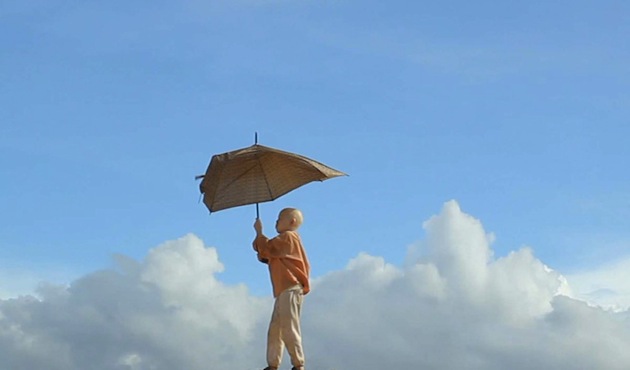
WHITE SHADOW dir. Noaz Deshe
The debut feature by Israeli artist Noaz Deshe ventures to Tanzania to spotlight an inhuman local sport: albino hunting. Apparently, albino body parts are believed to be used in magic potions in East Africa, and witch-doctors are paying handfuls of cash for them. It's a satisfactory reward in a poor country that mobilizes groups of brutes into mutilating little kids.
The initial thematic constellation could have lured the director into a tricky corner to escape from, but Deshe smartly evades any pitfalls of exploitation film or shockumentary.
Deshe (also lensing the film and taking care of music) penned the script with James Masson (who also helped with the music) using a coming-of-age as story vertebrae. Alias´ father is killed in an unprovoked night ambush. His mother helps him to flee from the wilderness and an uncertain future in the city.
Deshe switches between two modes, as documentarian and narrative filmmaker. Alias´ mostly wanders through city slums and junkyards, a backdrop also used to introduce topics such as local mobsters driving around with cement-mixers, child prostitution, which get the viewers into the perspective of a tough African life, which actually shies away from bad taste. The documentary style serves more as a tool to effectively draft a stern setting equally between the wilderness and the city. In the fiction territory, Alias bears near Christ attributes; innocent yet doomed, helping those who will eventually condemn him yet is inept of executing legitimate revenge against them.
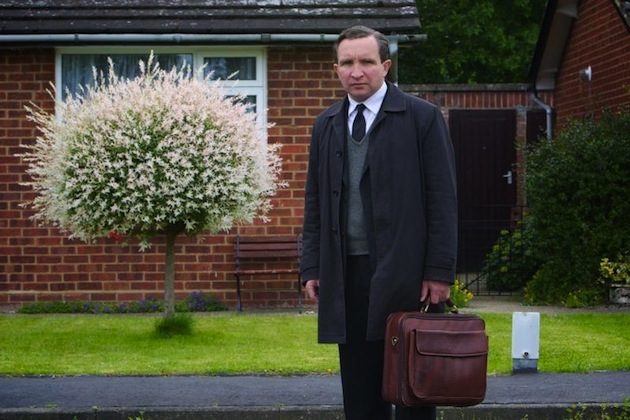
STILL LIFE dir. Uberto Pasolini
Pasolini´s feature promises a darker fare in the fashion of a dramedy which leans towards the well-known kitchen sink genre. The leading man Eddie Marsan pulls the film almost alone in an exquisite performance helped by Joanne Froggatt of Downtown Abbey. Marsan is solitary John May in charge of locating kin of the deceased.
May develops a sort of hobby to preserve their lives by little tokens proving their existence: old photos in his album of lost souls. While it is certainly a sad subject to pick, Pasolini took the golden middle route as for the depressing aspect... he finds an antidote. May acts not only as a guardian of the deceased but also as a keeper of the last shreds of their dignity. If the investigation into long lost family winds up unsuccessful, which it does almost every time, he then writes heartily their eulogies, selects the best music, attends their last service and even accompanies them to their place of eternal rest.
While Still Life takes off as minimalistic existential wallowing, sentimentality comes creeping in, mostly provoked by Marsan´s submissive yet willingness to carry on despite obstacles when his job is downsized. As such, Still Life is a small and well-structured British drama taking stab at the theme of losing contact with human beings (no pun intended). At the same time it is Pasolini´s love letter to humanity.
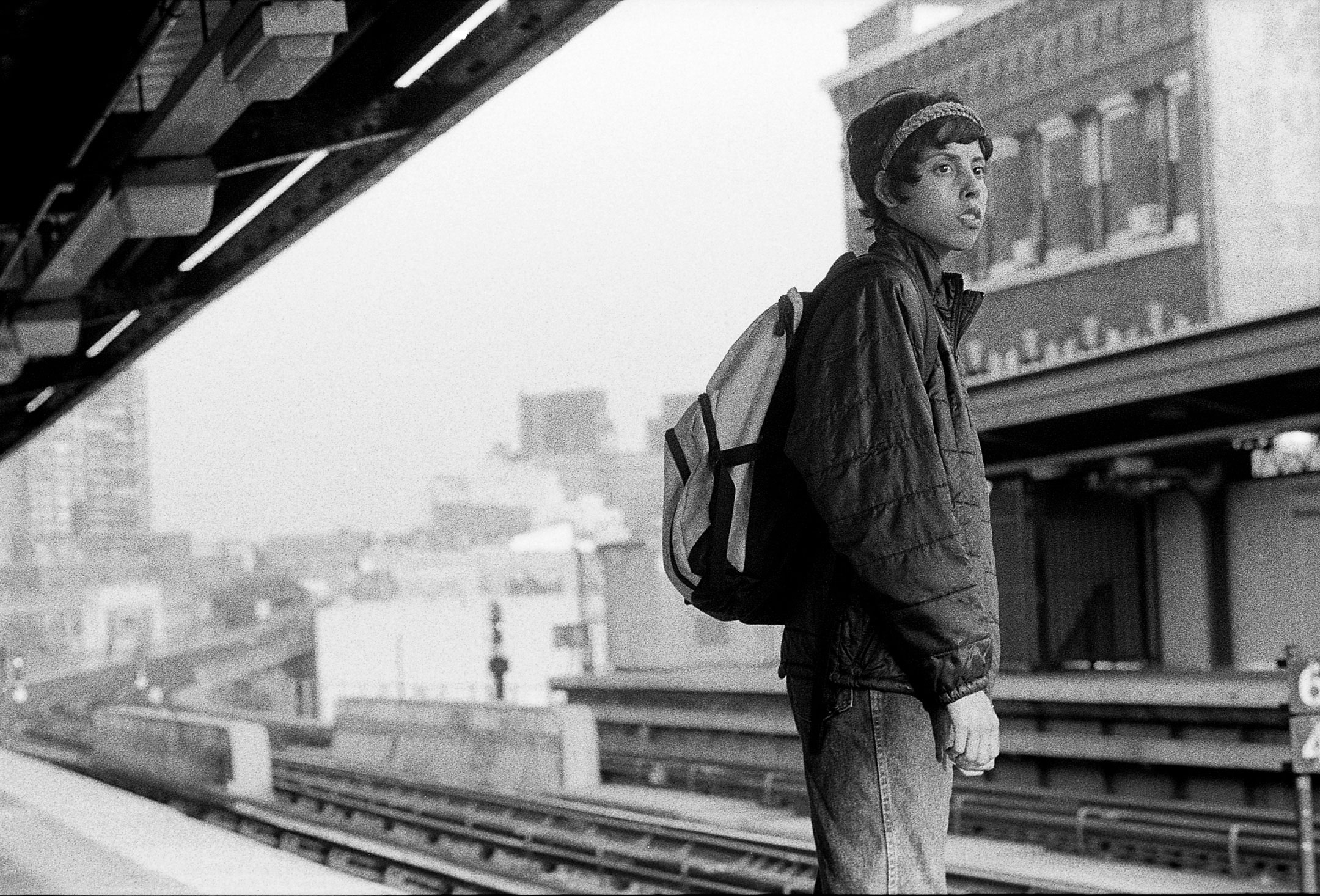
THE VOICE OF THE VOICELESS dir. Maximón Monihan
The feature debut of Maximón Monihan, The Voice of the Voiceless, is definitely a magic offering, despite tackling a sensitive and overlooked topic of modern day slavery and exploitation.
The film starts in colour in an unknown hut in Guatemala. A duo of apparently Christian missionaries keep persuading a husband and wife about the pros of studying in New York at a special school for deaf kids. Soon, their daughter Olga boards an airplane towards this supposedly bright future in the country of freedom and capitalism.
Coming to the Big Apple, the film switches into to a monochrome setting. This approach effectively points out the drabness of the daily routine the young protagonist experiences.
The Artist and Blancavienes - among others – popularised the reminiscence on silent era films, however Monihan ventures into another direction where formal aspects of the film are organically tied with the protagonist as well as her personal, as well as symbolic, perception of a twisted reality.
The director pushes this aesthetic further by accelerating the frames per second, rendering mostly the movement of characters akin to silent era slapstick. And you do not expect vaudevillian and anatomic slapstick while rape, murder, suicide and exploitation take place. But it works. And despite the heavy subject, The Voice of the Voiceless's rawness is abraded by the introduction of fairy tale elements and humour, pushing the film more into the territory of magical realism.
Monihan´s no-budget debut feature wields exceptional aptitude on these formal and stylistic levels, sometimes even brimming with various audio and visual perks such as fleeting explosions of colour and sound signifying desperate escapist psychohygiene. To put it simply, The Voice of the Voiceless is a revelation.

FLOATING SKYSCRAPERS dir. Tomasz Wasilewski
The sophomore feature of Tomasz Wasilewski has already attracted a fair share of attention and awards on the festival circuit. Floating Skyscrapers revolves around Kuba, a young pro swimmer, who is about to discover that he is not as heterosexual as he and his girlfriend originally thought after falling madly in love with a guy.
The film addresses sexuality in a number of ways. It plunge even deeper into the mindscape of Kuba's locked chambers of locker room fantasies, then wanders into the open arms of Sigmund Freud psychology, when Kuba gives a sponges his own mother in a quasi-incestual bathing séance that suggest an odd form of family-bonding.
Kuba keeps his thoughts to himself so at times it is hard to imagine what he is thinking. At times, viewers would flirt with the idea that he is just bi-curious and not gay. Nevertheless, Floating Skyscrapers is a coming-of-age/coming-out fare. The side plot featuring Kuba´s love Michal feels a bit calculated, as Michal mostly fights not being accepted as gay (mostly by his father), and as such the secondary plot mostly serves as explicit critique of societal ignorance.
Floating Skyscrapers does in fact go further than just making a couch session out of repressed feelings and hidden desires. Wasilewski revisits his debut feature's theme of personal crisis and its affect on one´s life. The film only confirms Wasilewski´s skills and strong reputation as an emerging young talent in Polish cinema.
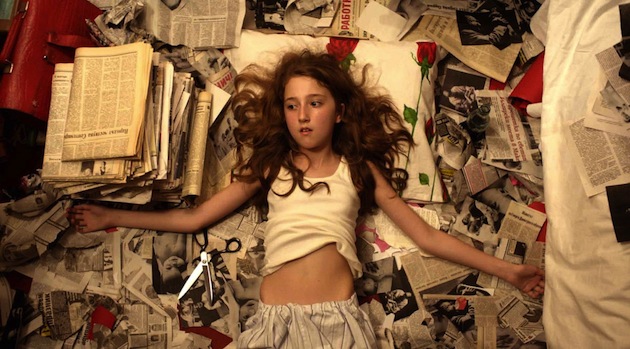
VIKTORIA dir. Maya Vitkova
Maya Vitkova, executive producer of Eastern Plays and director of several shorts, could not hope for a more striking debut. She rams the door and takes viewers by frontal attack with the 155 minute long chronicle of a dysfunctional family.
Mesmerizing art direction brings to life three decades of life under the rule of communism rushing towards an abrupt end. Vitkova proves to be a mature filmmaker defined by a singular screenplay defined by thought-provoking details and motifs.
The director chooses the point of view of the avowedly damaged wife, Boryana, who wishes to prevent pregnancy by any means necessary, several of them violent in the masochistic form. Her zealous struggle to annihilate any possibility of new life in her womb reaches shocking heights. If Vitkova aimed to subvert the archetype of mother, she has succeeded on many levels. The screenplay deserves further applause for handling such various and diverse motifs and allusions while tying them gracefully into a functional multilayered story. The antithesis of motherhood draws parallels to the Communist regime well. The director even uses archive footage to make the experience more vivid.
And then, against Boryana´s will, she becomes a mother, giving birth to a child without an umbilical cord, an accurate metaphor for the above. Nevertheless, the eponymous Viktoria (another savvy word-play, the name clearly derived from Victor) is immediately glamorized by the Communist party as the child of the decade. Another memorable curlicue is the subplot of Vitkoria´s peer who is born with deformation, thus stigmatised as a cripple and frequently bullied by Viktoria who is having the time of her life as the celebrity of the regime. The tapestry of destinies criss-crossing yet not being lost in the process and being crafted into coherent story is a testimony to Vitkova´s amazing capacities and keen eye for story, and her predestination to become a major figure in the new Bulgarian cinema.
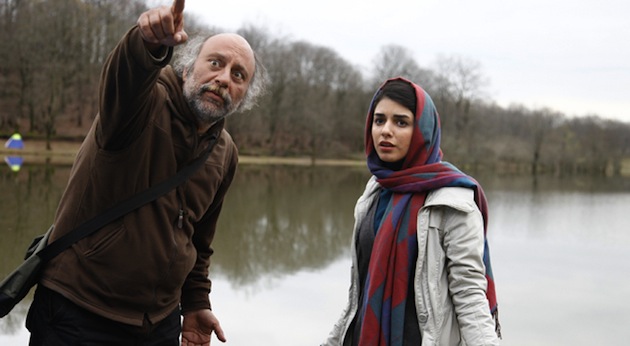
FISH & CAT dir. Shahram Mokri
If Vitkova´s Viktoria rams the door than Mokri´s Fish & Cat is a giant wrecking ball. It´s the pocket guide to things to do with film. And the paean to cinema.
Mokri displays an equal standard of excellence as Vitkova, yet he goes much further on the formal level. A cryptic title, Fish & Cat is about an Iranian restaurant serving human meat. At least the synopsis says so. During the whole duration (134 minutes) there is no trace of cooks chopping up human limbs into the meal of the day. The ultimate act of cannibalism unfolds in allusions and hints transforming the film into a cinematic poem.
And the best part is that the entirety of the film is in a single-shot floating through landscapes as well as time loops. To pat DP Mahmoud Kalari (who lensed Asghar Farhadi´s A Separation and The Past) on the shoulder would be an understatement as the camerawork goes beyond hypnotic and mesmerizing.
Mokri´s sophomore feature showcases the filmmaker´s versatility and daring. His riff on magical realism knits the gruesomeness of our world with the redemption from the other side, eulogizing strangely the lightness of the afterlife. The director does not linger with the revelation that the story is actually based on true events. After the horrifying acknowledgment provided by an opening intertitle we are dropped in front of the derelict restaurant offending every single taste bud. The suspiciously looking older man is approached by a young student and his friends. The natural expectation of butchery freewheels in our heads. That introductory disclosure is another tool to stuff the air with latent tension haunting the viewers until the very end.
Furthermore, the suspense frequently materializes as Mokri´s slyly plays on slasher and horror film tropes. Although it´s that kind of sophisticated intertextual play that intentionally defies viewers’ expectations, subverting them and transforming them into something new. In doing so, Fish & Cat displays a mastery of suspense.

Do you feel this content is inappropriate or infringes upon your rights?
Click here to report it, or see our
DMCA policy.




























